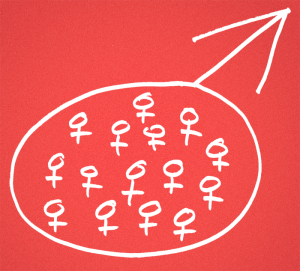On March 26th, a Libyan law student named Iman al-Obeidi burst into Tripoli’s Rixos Hotel and shouted that 15 of Muammar Gaddafi’s troops had beaten and gang-raped her, holding her against her will for two days. Covered in cuts and bruises, al-Obeidi was dragged away by undercover government security and charged with slander.
One spokesperson for the Libyan government explained that al-Obeidi was drunk and possibly mentally ill. Libyan state television called her a whore.
Thanks to international viral media attention and Libyan rebel protests in her name, the government released al-Obeidi after several days. Still, she remains in Tripoli under house arrest, and is not allowed to return to her family in Tobruk.
In light of the viral attention this situation earned, I would like to explore the discourse surrounding women: implicit messages communicated by mainstream media, and as accepted and perpetuated by Western society in general. I would also like to clarify that I will be using some generalizations, and that the root of the problem isn’t in mass media alone. It’s embedded so deeply into the fabric of our society, systems, and language that most of us don’t notice until we start to look for it.

First, male bias is normative in media. Sociologically speaking, something normative aligns with the social “norms” and is already assumed to be true. For example, capitalism is normative in American society.
Media coverage of school shootings are an example of how male normativity affects the conveyed messages. Since Columbine in 1999, mass media have responded to rashes of school shootings by reporting on issues of gun control and child violence. Instead, the media should address the fact that out of 103 documented school shootings in America since 1966, all but two perpetrators have been male.
Women, on the other hand, are always gendered in discourse and media. What does that mean? Women’s gender is always “a thing,” and men’s gender is not.
Consider how politicians like Sarah Palin and Hillary Clinton are portrayed in political cartoons. Palin is portrayed as curvy and “hot,” while Clinton is portrayed as butch and “manly”. While of course all political cartoons are caricatures, female politicians’ femininity (or lack thereof) is the dominant quality. Male politicians’ gender goes unnoticed; instead, cartoons emphasize their unique physical features.
Media featuring women tends to contain elements of sexuality, violence, or both. Iman al-Obeidi’s story would have gained much less exposure if she had simply been held captive, instead of being beaten and raped.
Of course, it’s important to discuss violence towards women. April is Sexual Assault Awareness month, and recent events such as an on-campus workshop for local bar employees and Smash it Dead Fest have been helpful in learning how we, as a community, can work to prevent rape and sexual assault.
I simply want to raise awareness of our society’s gendered discourse and ask those of you reading this to consider how male normativity manifests itself.
From my perspective, I see male normativity affecting women’s rights in many different ways: sexism in the workplace, harassment on the street, “date” rape jokes being totally acceptable in the entertainment industry, the threatened repeal of abortion rights, and the prevalence of domestic violence, to name a few.
How do you see your gender being portrayed? In the news? In movies? In music? An increasingly visible population of transgendered and intersexed people find it impossible to check off “M” or “F” on forms they fill out. The binary male-female view of gender is problematic in and of itself.
I am glad that al-Obeidi’s case received so much media coverage because it indubitably saved her life. However, I hope that as our society’s awareness of gender inequality grows, the mass media and everyone else will make an effort to “de-gender” our discourse so that “human being” is the only normative assumption in our culture.


One Comment on “Op-Ed: Allison Francis on Gendered Discourse and Normativity in the Mass Media”